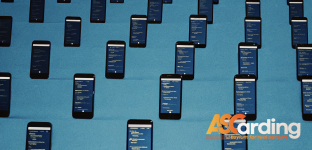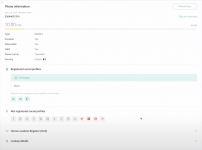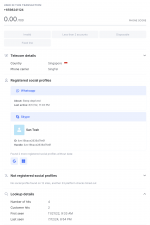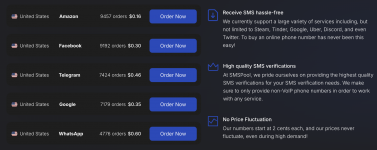d0ctrine
Diamond
- Joined
- 17.08.24
- Messages
- 107
- Reaction score
- 4,208
- Points
- 93

Sometimes your transaction declining can be attributed to a single component: your phone number. That shit isn't random. The phone number you put in can be the difference between seeing "Payment Approved" and watching your whole operation crash and burn. Most carders blow thousands on premium cards but skimp on getting good burner/receiver numbers, thinking it's a small thing, then wonder why their success rate is in the toilet.
This is even unavoidable for some since you can't even skip the phone number field. Major platforms like PayPal force you to verify a phone number just to checkout. This makes understanding how to use clean numbers a must.
How Phone Numbers Become Liability
What most rookie carders don't understand is that modern antifraud systems don't just check if a number you provided actually exists - they run it through a series of checks that happen instantaneously. When your number hits their system, here's what happens behind the scenes:
First, they instantly identify whether you're using a mobile, landline, or VoIP number. VoIP gets elevated risk scores immediately. Then they check the number's age - fresh numbers scream "burner" to their algorithms. They cross-reference your number against the billing address and name you provided - mismatches are a one-way ticket to declineville.
These systems maintain massive shared blacklists. If your number was ever tied to a chargeback or fraud case anywhere in their network, you're already burned. They also analyze usage patterns - the same number appearing across multiple accounts or showing unusual verification request patterns gets flagged.
Even the usage of the number matters. A Verizon number tied to social media accounts and sites like Viber and Whatsapp will look legit, while Voip numbers that doesn't match your billing address will get flagged.
The most advanced platforms like Signifyd and Forter don't just look at your number in isolation - they build an entire identity graph connecting your phone to devices, IPs, and emails you've used. One weak link in that chain can tank your entire operation. Their machine learning models weigh all these factors in milliseconds, often making the decision to decline your transaction in milliseconds. Seriously, look at how deep these fuckers go:
When you're trying to card high-security targets, using a flagged number is like means you're fucked before you even start.
VOIP = Dogshit
Most antifraud systems can detect VoIP numbers in an instant. They maintain massive databases that categorize phone numbers, and anything flagged as VoIP gets adds to your risk score.
Here's how the detection works:
1. When you enter a phone number, the site queries carrier databases using APIs
2. The API returns the number's "line type" (mobile, landline, VoIP)
3. If it's VoIP, you're immediately flagged as higher risk

Google Voice numbers are particularly radioactive - they're the first thing every antifraud system checks because they're free and absurdly common among fraudsters.
Sources of Non-VOIP Numbers
There are several ways to get a legitimate, carrier-issued phone number that won't trigger fraud alarms. Each has its own pros and cons:
For SMS Verification Only
Services like TextVerified, SMSPool, and JuicySMS offer access to real mobile numbers (not VoIP) specifically for receiving verification codes. These services maintain farms of actual SIM cards connected to the major carriers.
The problem is that these services use a limited pool of numbers that get recycled among thousands of users. By the time you get assigned one, it's probably been used for dozens of sketchy signups. Antifraud systems track these numbers, and the moment they see one from a known verification service, your risk score skyrockets.
If you're just setting up a few low-security accounts and don't need calls, this might work. But these numbers are bad for serious carding. TextVerified offers voice call verification too, but remember - if the number's already flagged in fraud databases, you're get increased risk score one way or the other.
Prepaid Carrier SIMs/eSIMs
The gold standard for reliability is getting an actual carrier number. MVNOs (Mobile Virtual Network Operators) like Tello, Mint Mobile, and US Mobile offer dirt cheap prepaid plans on major networks.
Tello's $5/month plan is basically a gift from the carding gods - cheap as fuck, runs on T-Mobile's network, and provides a 100% legitimate number that will pass any verification system.
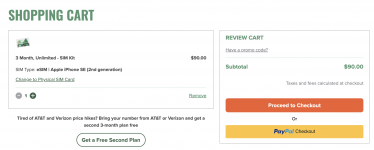
Look, this might seem like a hassle if you're just trying to card some cheap shit from Amazon. For small-time hits, the verification services might be good enough. But when you're going after the big fish - those high-security payment processors or trying to pull off a serious cashout - investing in a proper carrier number will help you tremendously. You can often even pick a number based on the zip you need.
The beauty is you can card these MVNO services themselves and get the eSIM delivered straight to your email. No physical SIM to worry about, no trips to sketchy convenience stores, just a clean number that slides through verification systems like a hot knife through butter.
No-KYC Prepaid eSIM Options
Now, this other option might seem like overkill if you're just trying to verify a throwaway account, but these options serve as perfect OPSEC tools when you need both verification power AND complete untraceability.
Services like Silent Link, Cloaked Wireless, and H2O Wireless provide actual mobile numbers - not that VoIP garbage that gets flagged instantly - while letting you stay completely anonymous.
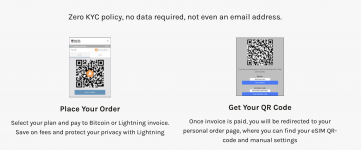
The magic here is that these are technically legitimate carriers, so their numbers pass verification systems with flying colors. Meanwhile, you're practically invisible since there's no ID trail connecting you to the number. Your data doesn't get logged, tracked, or sold to the highest bidder. You can activate most of these with nothing but crypto.
Most US prepaid carriers don't require ID verification - you can activate with just an email and payment method. This regulatory loophole makes these services perfect for short or long-term approach to burners.
The Road Ahead
Your phone number is a critical link in your operational security chain. VoIP numbers are convenient but utterly worthless for serious carding work due to sophisticated detection. Real carrier numbers, whether through prepaid SIMs or verification services, are essential for bypassing the first layer of antifraud systems.
Remember: in this game, your only as strong as its weakest link. A proper burner phone setup isn't just recommended—it's non-negotiable if you want to avoid becoming another statistic in the fraud department's quarterly report.
Now go out there and make your millions. d0ctrine out.


